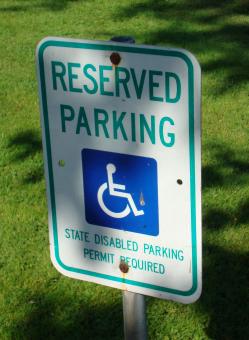Why do all the best parking spots go to people who can’t walk? That’s a question that haunts America’s biggest jerks every hour of every day. For those who can’t abide having to stroll 100 feet through a shopping mall parking lot to get to Ruby Tuesday, there’s nothing more alluring than a counterfeit or illicitly acquired handicapped-parking placard. It gives you all the benefits of being disabled, with no real downside except for inconveniencing people who are really and truly handicapped. Like I said, no real downside!
Probably the most famous case of handicapped-parking fraud happened in 1999, when NFL quarterback Cade McNown and 18 other current and former UCLA football players were charged with illegally using handicapped parking placards while they were enrolled at the school. All 19—including Skip Hicks, who rushed for eight touchdowns in 1998 as a running back for Washington, D.C.’s professional football team, and Brendon Ayanbadejo, who later won fame as one of the NFL’s most outspoken straight advocates for gay rights—pleaded guilty or no contest to the charges, and were sentenced to fines and community service. (I always thought this said a lot about why McNown was such a bust in the pros. A quarterback who’s too lazy to walk through a parking lot isn’t going to stand a chance against the Packers’ defense.)
But handicapped-parking fraud doesn’t just happen at California universities. It’s a problem all across the country, from Seattle, where it costs the city $1.4 million per year, to New Jersey, where the state recently tightened up its placard recertification process as a means to combat parking abuse.
The most recent outbreak of handicapped-parking fraud has come in Providence, R.I., a small city where pretty much everything is within walking distance. As Amanda Milkovits tells it in the Providence Journal, local valet parkers “noticed an unusual amount of cars with handicapped placards parked near the train station and downtown businesses.” So the Providence cops set up a sting operation of sorts in which they approached the drivers of placard-bearing cars and asked whether the placards actually belonged to them.
They received a variety of responses. Some people said the placards belonged to relatives. Some people said nothing. One able-bodied lady allegedly claimed that she was using the placard because she wanted a close parking spot in case of emergency. I particularly enjoyed this exchange:
A Woonsocket woman parked on Exchange Terrace and heading to work told Sgt. Paul Zienowicz that it was hers. Then, it was her husband’s, whose name she couldn’t quite remember. Then it was her son’s.
“Then she said, ‘OK, I’ll tell you the truth, officer,’ Zienowicz recalled. “I said, ‘That would be refreshing.’ ”
The placard was actually listed to a man in Olneyville, who may or may not be a friend’s husband.
The not-handicapped handicapped parkers all got written up, and they’ll face a potential $500 fine, which seems a bit too lenient, if you ask me. Maybe they should instead be sentenced to a week in a wheelchair, so they can see what it’s like to actually be handicapped. Or maybe, if convicted, they should be named and shamed on handicappedfraud.org, a website where suspicious citizens can post information about drivers whom they suspect are gaming the disabled-parking system. “Our organization does not issue tickets, but raises awareness and hopefully shames offenders into paying for their parking meters and leaving designated spaces for the truly handicapped,” reads the site’s About Us section. A noble goal, but is the site really making a difference? “We are Making a Difference!” the homepage states. Well, that settles that. Keep it up, handicappedfraud.org!
Crime is Slate’s crime blog. Like us on Facebook, and follow us on Twitter @slatecrime.
